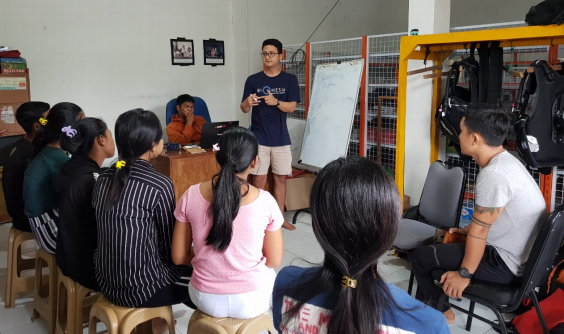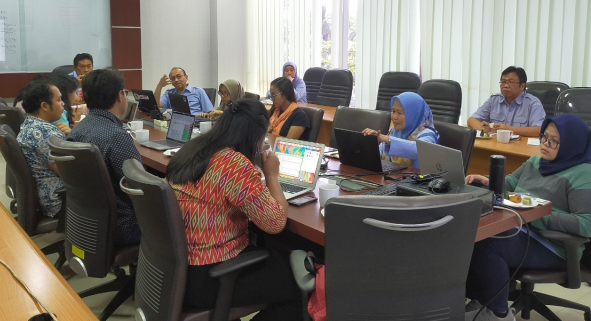|
Cycle 8 (2019 Deadline)
Advancing shark conservation through innovative molecular and multi-stakeholder approaches
PI: Andrianus Sembiring (andrianus@bionesia.org, andsembiring@gmail.com), Yayasan Biodiversitas Indonesia (Bionesia), in partnership with Udayana, Diponegoro, and Nahdlatul Ulama Universities
U.S. Partner: Paul Barber, University of California, Los Angeles
Project Dates: November 2019 - October 2023
Project Overview
Intensive shark fishing, driven by the high demand for shark fins from China, Hong Kong, and Singapore, is rapidly depleting global shark populations, with corresponding negative impacts on marine ecosystems. To combat these declines and preserve ecosystem function, a consortium of stakeholders is taking important steps to protect global shark populations. One important step is listing 12 shark species as critically endangered under the Convention on International Trade in Endangered Species (CITES). Indonesia is among the world’s leading shark fishing nations and Indonesian regulations on shark fisheries follow CITES guidelines. But these regulations are nearly impossible to enforce because of high volume and because the landings come in a form (fins) that precludes species identification. The inability to identify shark fins entering the global market prevents enforcement, contributes to ineffective management of shark fisheries, and allows the illicit trade of protected elasmobranchs.
DNA barcoding is a molecular genetic technique where an unknown sample can be identified by species by comparing its DNA sequence to a reference database. It takes several days to DNA barcode a sample of interest, and this time lag severely hampers the ability of regulators to identify samples from shark fin shipments because many countries, including Indonesia, only provide 24 hours for species identification prior to shipment. Therefore, there is a critical need for a reliable, fast, and cost-effective method for positive species identification of shark products entering international markets.
This PEER project focused on developing tools to provide the data required for meaningful enforcement, including working towards a DNA-based field deployable assay to identify and detect CITES-listed sharks, providing current information on shark exploitation in Indonesia, and integrating genetics and traditional fisheries data to support sustainable shark fishing and trading policies.
Final Summary of Project Activities
Researchers collected more than 100 samples from a fish market and shark exporting company in East Java and analyzed the samples using DNA barcoding and real-time PCR (rtPCR). They also collaborated with the Coastal and Marine Resources Management Center (BPSPL) Denpasar, which sent its shark samples as part of the verification process for export. The PI Mr. Sembiring and his colleagues tested several kinds of DNA primers for shark identification on the CITES list.
The PEER team hosted several workshops and trainings on genetic tools for species identifications attended by researchers, students, representatives from private companies, and staff from an Indonesian government institution focusing on protecting marine resources. The researchers trained some of the participants on DNA extraction from shark samples and on species identification using rtPCR methods.
Through the PEER project, the team awarded research scholarships to six undergraduate and two graduate students for research related to shark genetics. They also hosted three intern students who learned to do laboratory work, including DNA extraction, PCR, and data analysis.
On the outreach side, more than 200 middle and high school students in North Bali attended a shark and marine conservation program run by the PEER team. The program sought to increase student awareness and understanding of protected marine biota in their local region, as well as understanding of marine conversation.
The researchers published several articles about their results in international journals and participated in the 5th Asia Pacific Coral Reef Symposium (APCRS) in Singapore. They also collaborated with IPB University to hold the 6th Embrio International Symposium, attended by participants from 10 countries.
 |  | | Project team member Danie Al Malik leading a shark education session for students in North Bali. | The Department of Research and Natural Resources-Ministry of Marine and Fisheries Indonesia invited the team to discuss shark data collection protocol. (photo courtesy of Dr. Sembiring) |
Publications
Meuthia Maharani Kanedi, Diah Permata Wijayanti, Ita Widowati, Muhammad Danie Al Malik, Ni Luh Astria Yusmalinda, and Andrianus Sembiring. 2023. Genetic diversity of bigeye thresher shark (Alopias superciliosus Lowe, 1841) landed in Palabuhanratu Fishing Port, Sukabumi, West Java, Indonesia. BIODIVERSITAS 24(6): 3488-3494. https://doi.org/10.13057/biodiv/d240646
Muhammad Danie Al Malik, Mochamad Iqbal Herwata Putra, Edy Topan, Ni Luh Astria Yusmalinda, Ni Putu Dian Pertiwi, Yuliana Fitri Syamsuni, Ni Kadek Dita Cahyani, Enex Yuni Artiningsih, Sarah Lewis, Lumban Nauli Lumban Toruan, Muhammad Ghozaly Salim, Firmansyah Tawang, Faqih Akbar Alghozali, Derta Prabuning, and Andrianus Sembiring. 2023. Population structure of endangered spinetail devil ray (Mobula mobular) in the Lesser Sunda Seascape, Indonesia, revealed using microsatellite and mitochondrial DNA. Aquatic Sciences 86: 6. https://doi.org/10.1007/s00027-023-01020-3
Andrianus Sembiring, Aji Wahyu Anggoro, Ni Kadek Dita Cahyani, Ni Putu Dian Pertiwi, Ni Luh Astria Yusmalinda, Paolo Momigliano, Ida Ayu Astarini, Dwi Ariyoga Gautama, Muhammad Danie Al-Malik, Gusti Ngurah Mahardika, and Shang-Yin Vanson Liu. 2023. The genetic connectivity of the silky shark (Carcharhinus falciformis) across Indonesia. Regional Studies in Marine Science 68: 103230. https://doi.org/10.1016/j.rsma.2023.103230
Erica Denise Wardana, I Nyoman Giri Putra, Muhammad Danie Al Malik, Ni Luh Astria Yusmalinda, Enex Yuniarti Ningsih, Ni Putu Dian Pertiwi, Muhammad Ghozaly Salim, Meuthia Maharani Kanedi, Mochamad Iqbal Herwata Putra, and Andrianus Sembiring. 2023. Population genetic structure of the bentfin devil ray (Mobula thurstoni) in the South Indonesia Sea with limited sample based on ND5 gene. BIODIVERSITAS 24(7): 3743-3749. https://doi.org/10.13057/biodiv/d240711
Maryrose Easter Tapilatu, Diah Permata Wijayanti, Subagiyo, Andrianus Sembiring, Ni Luh Astria Yusmalinda, Enex Yuniarti Ningsih, Muhammad Danie Al Malik, and Ni Putu Dian Pertiwi. 2023. Genetic diversity of wedgefishes and guitarfishes at landing sites in East Indonesia using Cytochrome Subunit I (COI). BIODIVERSITAS 24(5): 3120-3127. https://doi.org/10.13057/biodiv/d240504
Muhammad Danie Al Malik, Mochamad Iqbal Herwata Putra, Edy Topan, Ni Putu Dian Pertiwi, Enex Yuni Artiningsih, Sila Kartika Sari, Sarah Lewis, Derta Prabuning, and Andrianus Sembiring. 2022. Genetic variation of oceanic manta ray (Mobula birostris) based on mtDNA data in the Savu Sea, Indonesia. BIODIVERSITAS 23(3): 1700-1706. https://doi.org/10.13057/biodiv/d230362
Back to PEER Cycle 8 Grant Recipients
|
|
|
|





